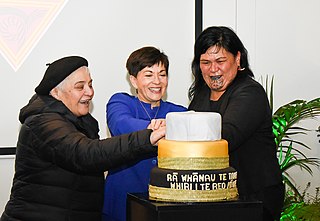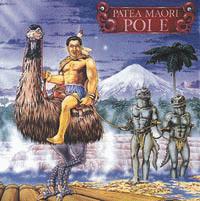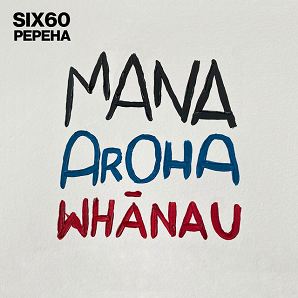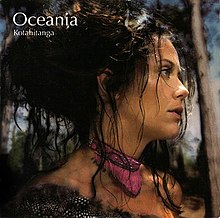
Te Wiki o te Reo Māori is a government-sponsored initiative intended to encourage New Zealanders to promote the use of the Māori language which is an official language of the country. Māori Language Week is part of a broader movement to revive the Māori language. It has been celebrated since 1975 and is currently spearheaded by Te Puni Kōkiri and the Māori Language Commission, with many organisations including schools, libraries, and government departments participating.
Traditional Māori music, or pūoro Māori, is composed or performed by Māori, the indigenous people of New Zealand, and includes a wide variety of folk music styles, often integrated with poetry and dance.

"Sway" is a song by New Zealand singer Bic Runga. It was released as the second single from her debut studio album, Drive (1997), in 1997. The song peaked at No. 7 in New Zealand and No. 10 in Australia, earning gold certifications in both countries. At the 32nd New Zealand Music Awards, the song won three awards: Single of the Year, Best Songwriter, and Best Engineer. In 2001, it was voted the sixth-best New Zealand song of all time by members of the Australasian Performing Right Association (APRA). A music video directed by John Taft was made for the song.

Jeremy "Jaz" Coleman is an English singer and musician. He came to prominence in the early 1980s as the lead vocalist and keyboardist of post-punk group Killing Joke.

Democracy is the tenth studio album by English post-punk band Killing Joke, released on 1 April 1996 by Butterfly Records and Big Life.
Moana Maree Maniapoto is a New Zealand singer, songwriter and documentary maker. Widely considered one of New Zealand's most successful indigenous acts, her music is described as a fusion of traditional Māori haka, chants and taonga pūoro, with contemporary soul, reggae and classical styles. Moana was briefly married to New Zealand politician and radio personality Willie Jackson, during which time she was known as Moana Maniapoto-Jackson; they divorced in 2001. In 2016, Moana was inducted into the New Zealand Music Hall of Fame.

Poi E is an album released by New Zealand Māori music group the Pātea Māori Club. In 1984, the Māori language title track "Poi E" topped the New Zealand pop charts for four consecutive weeks, and was that year's biggest selling single - outselling all international recording artists. The album also produced three other charting singles in New Zealand but did not chart itself until nearly three decades after its original release.

"Poi E" is a song by New Zealand group Pātea Māori Club off the album of the same name. Released in 1983, the song was sung entirely in the Māori language and featured a blend of Māori cultural practices in the song and accompanying music video, including Māori chanting, poi dancing, and the wearing of traditional Māori kākahu (garments). The song reached No. 1 in New Zealand in each of the following three decades.
Hirini (Sid) Melbourne was a Māori composer, singer, university lecturer, poet and author who was notable for his contribution to the development of Māori music and the revival of Māori culture. He played traditional instruments and his waiata (songs) have preserved traditions and used Māori proverbs. He received the New Zealand Order of Merit in recognition of his services to Māori music. He was from Ngāi Tūhoe and Ngāti Kahungunu Māori tribes.

"God Defend New Zealand" is one of two national anthems of New Zealand, the other being "God Save the King". Legally the two have equal status, but "God Defend New Zealand" is more commonly used. Originally written as a poem, it was set to music as part of a competition in 1876. Over the years its popularity increased, and it was eventually named the second national anthem in 1977. It has English and Māori lyrics, with slightly different meanings. Since the late 1990s, the usual practice when performed in public is to perform the first verse of the national anthem twice, first in Māori and then in English.
Kotahitanga may refer to several things relating to the Māori people of New Zealand:

Waiata / Anthems is compilation album by New Zealand artists, whereby they re-record previous songs from English to Māori language. It was released in New Zealand 6 September 2019 and it debuted at number 1 on the Official New Zealand Music Chart.

"Tukituki Te Manawa" is a song by New Zealand band Drax Project, performed in Māori language. It was the band's second song released as a part of the Waiata / Anthems project, with their first being a re-release of their 2017 single "Woke Up Late" for the 2019 Waiata / Anthems compilation album. An unreleased song by the band originally written in English, "Tukituki Te Manawa" translated into Māori by Hinewehi Mohi and Sir Tīmoti Kāretu and released on Christmas Day 2020. In 2021, the song was the subject of an episode of a TVNZ OnDemand documentary series, documenting the creation of music for Waiata / Anthems.

Dame Hinewehi Mohi is a New Zealand musician and producer, best known for her double-platinum album Oceania (1999) and its lead single "Kotahitanga (Union)", performing the New Zealand National Anthem in Māori during the 1999 Rugby World Cup, and as a producer for the 2019 Māori language compilation album Waiata / Anthems.

Te Ao Mārama is the second extended play by New Zealand singer-songwriter Lorde. It was released on 9 September 2021, through Universal Music New Zealand. It consists of performances of five songs from Lorde's third studio album, Solar Power, in the Māori language.

"Pepeha" is a song by New Zealand band Six60, performed bilingually in English and Māori. "Pepeha" is the band's second song to be recorded in Te Reo Māori, and was released as a single in 2021 to coincide with Te Wiki o te Reo Māori. The song was written by Six60 band members Marlon Gerbes and Matiu Walters, alongside Te Reo experts Mahuia Bridgman-Cooper, Jeremy Tātere MacLeod and Sir Tīmoti Kāretu.

"Kua Makona" is the debut single from Moana Maniapoto. Produced by Dalvanius Prime and sung in the Māori language, the song was used in a campaign for the Alcohol Advisory Council of New Zealand. In 1993, the song was re-recorded as a pop-reggae version entitled "Kua Makona ", released as a single by Maniapoto's group Moana & the Moahunters. This version was later included on their debut album Tahi (1993).

Oceania is the debut studio album by New Zealand musical act Oceania, a collaboration between New Zealand vocalist Hinewehi Mohi and English producer Jaz Coleman. Sung in Māori, the album is a blend of Māori music traditions and instruments with 1990s house and pop.
"Sundown" is a song by New Zealand band Six60, released as the final single from their third album Six60 in August 2020.
Maree Alicia Hiria Sheehan is a New Zealand sonic artist, sound designer, composer and lecturer, and is a research fellow in the Te Manawahoukura Research Centre at Te Wānanga o Aotearoa. In 2024 the Royal Society Te Apārangi awarded Sheehan the Te Koponui Māori Research Award for her creation of audio portraits of Māori women.














